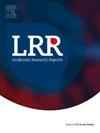Venetoclax combination with Cladribine, idarubicin, Cytarabine for relapsed T-Cell acute lymphoblastic leukemia/lymphoblastic lymphoma treatment: A case report and literature review
IF 0.9
Q4 HEMATOLOGY
引用次数: 0
Abstract
Acute lymphoblastic leukemia (ALL) represents only 20 % of adult acute leukemias, while Lymphoblastic lymphoma is even rarer, accounting for 2 % of adult non-Hodgkin lymphomas. T-acute lymphoblastic leukemia (T-ALL) and T-lymphoblastic lymphoma (T-LBL) are neoplasms characterized by the presence of immature T-cell precursors or lymphoblasts. Relapsed T-ALL or LBL is associated with a very poor prognosis, necessitating the exploration of novel therapeutic approaches. This case report describes the use of Venetoclax in combination with Cladribine, Idarubicin, and Cytarabine (CLIA) as salvage therapy for relapsed T-ALL/T-LBL. The treatment regimen resulted in remission and negative minimal residual disease. However, it was accompanied by delayed count recovery, febrile neutropenia, and Central Line-Associated Bloodstream Infection. The management of central nervous system involvement was challenging due to low platelet counts requiring transfusion support. The findings highlight the need for further investigation into the efficacy and optimal therapeutic regimen for relapsed T-ALL/T-LBL. Additionally, the case emphasizes the importance of early salvage therapy and potentially consolidative hematopoietic stem cell transplantation for improved survival outcomes in relapsed T-ALL/T-LBL patients.
Venetoclax联合克拉德滨、依达柔比星、阿糖胞苷治疗复发性t细胞急性淋巴细胞白血病/淋巴细胞淋巴瘤1例报告并文献复习
急性淋巴母细胞白血病(ALL)仅占成人急性白血病的20%,而淋巴母细胞淋巴瘤更罕见,占成人非霍奇金淋巴瘤的2%。t急性淋巴母细胞白血病(T-ALL)和t淋巴母细胞淋巴瘤(T-LBL)是一种以未成熟t细胞前体或淋巴母细胞存在为特征的肿瘤。复发的T-ALL或LBL预后非常差,需要探索新的治疗方法。本病例报告描述了使用Venetoclax联合cladriine, Idarubicin和Cytarabine (CLIA)作为复发T-ALL/T-LBL的补救性治疗。治疗方案导致缓解和阴性最小残留疾病。然而,它伴随着计数恢复延迟、发热性中性粒细胞减少和中央线相关血流感染。由于血小板计数低,需要输血支持,中枢神经系统受累的管理具有挑战性。研究结果强调需要进一步研究复发T-ALL/T-LBL的疗效和最佳治疗方案。此外,该病例强调了早期补救性治疗和潜在的巩固性造血干细胞移植对改善复发T-ALL/T-LBL患者生存结果的重要性。
本文章由计算机程序翻译,如有差异,请以英文原文为准。
求助全文
约1分钟内获得全文
求助全文

 求助内容:
求助内容: 应助结果提醒方式:
应助结果提醒方式:


